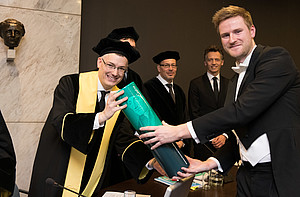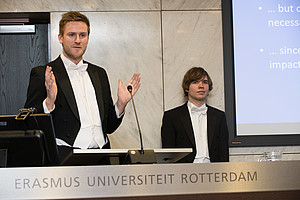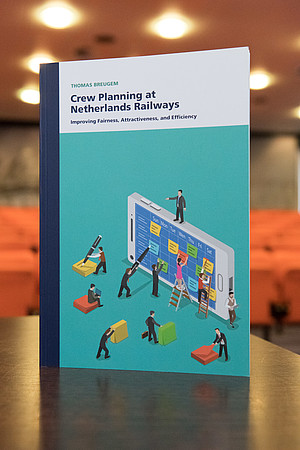PhD Defence Thomas Breugem

In his dissertation ‘Crew Planning at Netherlands Railways: Improving Fairness, Attractiveness, and Efficiency’, Thomas Breugem studies the Railway transportation and mass transit which play a vital role in modern-day society. As a result, they have a major impact on everyday life. Thomas Breugem defended his dissertation in the Senate Hall at Erasmus University Rotterdam on Friday, 24 January at 13:30. His supervisors are Prof. Dennis Huisman(EUR) and Dr. Twan Dollevoet (EUR). Other members of the Doctoral Committee are Jesper Larsen (DTU), Ralf Borndoerfer (Zuse Institute Berlin), Luk van Wassenhove (INSEAD), Albert Wagelmans (ESE), Ilker Birbil (ESE) and Erwin Abbink (NS).
About Thomas Breugem

As a researcher, Thomas aims at applying state-of-the-art Operations Research techniques to complex practical problems. His current work focuses on public transportation and humanitarian logistics. In both fields, a thorough understanding of the practical context is necessary to develop efficient decision support. In 2017, Thomas was awarded the INFORMS Railway Applications Section Best Student Paper Award for his work on integrating fairness into the crew rostering process at Netherlands Railways. Furthermore, he has published in scientific journals such as Transportation Research Part B: Methodological and Computers and Operations Research.
Thomas holds an MSc degree, summa cum laude, in Econometrics and Management Science, with a specialization in Operations Research and Quantitative Logistics from the Erasmus University Rotterdam. In 2015, Thomas started his PhD candidacy at the Erasmus Research Institute of Management at the Erasmus University Rotterdam. Thomas presently works as a Post-Doctoral Research Fellow at INSEAD’s Technology and Operations Management department. Within this department, Thomas is affiliated with the Humanitarian Research Group, a group that focuses on impactful practice-based research in line with the UN Sustainable Development Goals.
Thesis Abstract

Railway transportation and mass transit play a vital role in modern-day society. As a result, they have a major impact on everyday life: The societal costs of disturbances, such as delayed or cancelled trips, and strikes of personnel can be as large as hundreds of millions of euros. In both cases, crew planning plays an important role. In the case of disturbances, for example, the re-planning of crew is a crucial part of an efficient response, whereas strikes can be avoided by incorporating the demands of the employees in the crew planning process.
In recent years, Netherlands Railways, the largest passenger railway operator in the Netherlands, has successfully developed high-quality decision support and improved their crew planning process. In this thesis, we take the next step: We consider novel optimization problems that aim at improving and/or integrating important parts of the crew planning process. In doing so, we focus on the efficiency, fairness, and attractiveness of the crew schedule. For each of the introduced problems, we develop suitable solution approaches and analytical results and validate our methods using real-world data from NS.
View photos of Thomas's defence
Photos: Michelle Muss


